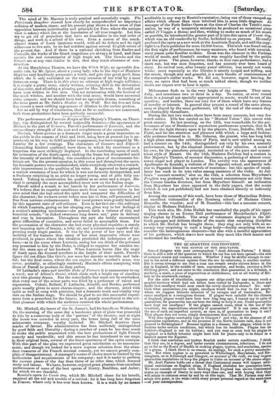The performance of Lucrezia Borgia at Her Majesty's Theatre, on
Thurs- day, was distinguished by several noticeable features,—the appearance of Moriani in the part of Gennaro, Parodi's performance of Lucrezia, and the extraordinary strength of the cast and completeness of the ensemble.
Moriani, whose powers as a dramatic singer made a great impression on the public in the seasons of 1845 and 1846, being here at present (as is an- nounced) on his way to fulfil another engagement, has been engaged by Mr. Lumley for a few evenings. The characters of Gennaro and Edgardo (demanding kindred qualities) were those in which his excellence as a tragedian was most strikingly displayed. In the concluding scene of each, his delineation of the death-agony, racking the frame but disregarded amid the intensity of mental feeling, was considered a piece of consummate his- trionic art. On the present occasion, in this scene and throughout the opera, his dramatic powers were undiminished, while everybody observed a remark- able improvement in the qualities of his voice. It appeared to have gained a mellow sweetness of tone for which it was not formerly distinguished, and a freshness surprising in an artist no longer young, and of gifts fully ma- tured. Taking in combination his qualities as an actor and a singer, Mo- riani is certainly the most accomplished tenor now on the Italian stage.
Parodi added a wreath to her laurels by her performance of Lucrezia. We believe that its superior excellence arose from some conviction in her own mind that she had seized the spirit and conquered the difficulties of the character; for we have never before seen her so firm, self-possessed, and free from nervous embarrassment. Her vocal powers were greatly benefited by this apparent state of self-reliance. Even in her first air—the soliloquy in which Lucrezia, gazing on her sleeping son, gives way to her feelings of a mother's admiring tenderness—she poured forth a volume of rich and beautiful sounds, " in linked sweetness long drawn out," pure in delivery and true in intonation. Throughout the part she boldly encountered great difficulties of execution, and never failed to accomplish them. For the personation of the character she had every physical requisite; a stately and imposing style of beauty, a lofty air, and a countenance capable of ex- pressing every tragic passion. It was by the power of her eyes and the mobility of her features that many of her most impressive effects were produced, in places where the situation precluded the indulgence of ges- ture,—as in the scene where Lucrezia, seeing her son drink of the poisoned cup presented to him by the Duke, is obliged to suppress her emotion un- der the stern eye of her husband. When Lucrezia bursts like the angel of death upon the doomed revellers in the height of their mirth, Parodi's figure did not dilate like Grisi's, nor were her accents so terrible and bale- ful; but the final scene, where the son expires in the mother's arms, was never, probably, so affectingly rendered; Moriani's efforts conspiring with those of Parodi to produce its deep pathos.
Of Lablache's stern and terrible Duke of Ferrara it is unnecessary to say a word; nor of Alboni's Orsini, which sheds such a bright ray of sunshine over this gloomy drama. But the remarkable fact must not be overlooked, that every one of the minor parts was filled by a performer of talent and reputation. Goleta, Belletti, F. Lablache, Arnoldi, and Bordas, performed parts usually given to mere chorus-singers; and the choruses, acted with spirit as well as sung with precision, had a dramatic truth and vitality very rare on the Italian stage. We should be glad to see this successful experi- ment form a precedent for the future; as it greatly contributed to the evi- dent pleasure with which the audience received the whole performance.


























 Previous page
Previous page